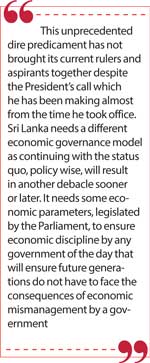Sunday Feb 15, 2026
Sunday Feb 15, 2026
Friday, 10 May 2024 00:20 - - {{hitsCtrl.values.hits}}

Vast amounts could be saved by better expenditure management, and besides, it will increase the confidence of the people that their taxes are being utilised fairly and justly
 On the 138th observance of World Labour Day, born from a historic struggle for rights, our nation stands at a pivotal moment. Regardless of political affiliations, it falls upon each of us to shoulder the unshakable duty of fortifying our economy and propelling our nation onward – President Ranil Wickremesinghe
On the 138th observance of World Labour Day, born from a historic struggle for rights, our nation stands at a pivotal moment. Regardless of political affiliations, it falls upon each of us to shoulder the unshakable duty of fortifying our economy and propelling our nation onward – President Ranil Wickremesinghe
Political catch phrases like “Dharmishta Samajaya”, “Yahapalanaya” have won elections. People voted for these and the leader’s rhetoric as they either felt genuinely that they lived in a society that was not just, or in an “ayahapath palanaya”, an unjust governance environment or they were conditioned to think as such with smartly managed political rhetoric. In either case, it’s the people who voted in leaders and governments to office and in either case, the reality after years of governance did not match the rhetoric for the people of the country.
In its 76 years as an independent nation, one legacy that no rational person can deny is the financial dependence of the nation to others. The nation has survived because of this dependence. Today, the nation is in debt as it has never been before and this debt exceeds its worth, its GDP, by more than 20%. Even if the country is sold at its GDP value, it will still owe more than 20% of its worth to its debtors.
This unprecedented dire predicament has not brought its current rulers and aspirants together despite the President’s call which he has been making almost from the time he took office. Sri Lanka needs a different economic governance model as continuing with the status quo, policy wise, will result in another debacle sooner or later. It needs some economic parameters, legislated by the Parliament, to ensure economic discipline by any government of the day that will ensure future generations do not have to face the consequences of economic mismanagement by a government.
What are the economic parameters that the rulers and aspirants could and should agree on irrespective of their political differences? They could for example agree by way of legislation to set some ceilings on debt, expenditure, a GDP target, savings of foreign exchange earned through exports and the sweat and tears of housemaids, construction workers and others who have gone overseas and remitting money to Sri Lanka. Examples are:
a. A legislatively agreed debt to GDP ratio that cannot be exceeded without a 2/3rd majority in Parliament. Its is worth noting that as per Central Bank data, this ratio was 75% in 2015, it had increased to 97% in 2019 and it is 120 % today.
b. A legislatively agreed GDP growth target rate. It is worth noting again that the GDP growth as per the Central Bank was 6.9% in 2015, 2.7% in 2019 and averaging around 2% in 2024 after two years of negative growth. Again, any revision of this target will have to be agreed by a 2/3rd majority in Parliament.
c. A legislatively agreed consumption expenditure component as a percentage of the country’s income. While project expenditure that yields a dividend for the country could be excluded from this, the principle that consumption expenditure must be met with the country’s income has to be enshrined in the constitution. Any revision of this percentage will have to be agreed by a 2/3rd majority in Parliament. Savings accrued from this could be credited to a rupee development fund.
d. A legislatively agreed foreign exchange savings fund that is to be used only during emergency situations and with the approval of 2/3rd of the Parliament.
These parameters will ensure the country operates within its income, it will save money for a rainy day and the disastrous situation that befell the country will not happen again. The country could contain its debt by not allowing it to exceed a legislated percentage of the GDP. It will be the responsibility of the government of the day to adhere to these legislative requirements which will be enshrined in the constitution to save future generations from being driven into an abyss as happened.
Assigning the responsibility
 Assigning the responsibility for enacting this legislation and then ensuring its compliance is an onerous task and judging by the reputation of most politicians of the day, one cannot be blamed for having a deep sense of scepticism about the political process related to compliance with the legislation. However, the legislature is the supreme law-making body of the country and along with an independent judiciary, people should have the confidence that they could seek justice from the judiciary if members of the legislature fail to ensure the government of the day complies with the legislation.
Assigning the responsibility for enacting this legislation and then ensuring its compliance is an onerous task and judging by the reputation of most politicians of the day, one cannot be blamed for having a deep sense of scepticism about the political process related to compliance with the legislation. However, the legislature is the supreme law-making body of the country and along with an independent judiciary, people should have the confidence that they could seek justice from the judiciary if members of the legislature fail to ensure the government of the day complies with the legislation.
Managing economic governance within the parameters that have been legislated will not thwart development and growth as they will give opportunities to increase expenditure, provided they have successfully increased the country’s income. They would have the opportunity to borrow more for new, viable projects if they have been successful in increasing the GDP of the country as debt will be a legislated percentage of the GDP. The amount saved in rupees and in foreign exchange will be more if they have managed to earn more foreign exchange or they have reduced their expenditure by astute expenditure management.
Corruption, waste, and unproductive expenditure will all have an impact on these parameters and necessary independent mechanisms will have to be introduced and existing ones strengthened to curb waste that occurs through corruption and unproductive expenditure. As everyone seems to agree, corruption by way of bribery, deliberate higher payments on contracts and tenders have become a way of life afflicting the country and people should have the confidence they could resort to judicial action on these practices to take alleged perpetrators to courts. The taker of a bribe is not the only party responsible for the unsavoury practice. The giver is equally responsible and should face punishment as severe as a taker of a bribe.
In respect of income, the government of the day should have the guts to reign in tax dodgers irrespective of who they are, especially the high-income earners who either do not pay any taxes or pay very nominal amounts. A tax system has to be fair to all concerned whether one is a low-income earner or a high-income earner, but a system should not burden lower income categories and deprive them of funds for essential expenditure. For most higher-income categories, a higher tax payment does not cause a reduction in essential expenditure, but a dip in their expenditure for optional luxury items.
Vast amounts could be saved by better expenditure management, and besides, it will increase the confidence of the people that their taxes are being utilised fairly and justly. Luxuries afforded to politicians could be drastically reduced.
Financial indiscipline is the root cause
While it is possible that institutions like the IMF may have agendas to further the particular interests, a key benefit for Sri Lanka is the degree of forced financial discipline that the IMF agreement brings in. Financial indiscipline is at the root cause of the debacle that the country faced, and the economic governance parameters proposed in this article need to be considered in this light. The country does not have to approach the IMF, resort to borrowings using ISBs or take bilateral and multilateral loans if the proposed economic parameters are adhered to. Loans could be obtained for viable income generating projects, but project financing could also be done by opening them to investors.
In this election year, in terms of closing the gap between political rhetoric and reality, a methodology for the ongoing accountability mechanism for political leaders and political parties to the people of the country has to be introduced. The manifestos of political parties and of aspirants to the high office of President should become a legally enforceable social contract between them and the people. Manifestos of the past have basically been useless documents mostly containing motherhood statements. Hardly any debate or discussion has been had on them and voters too have shirked their responsibility in this two-way process that entails accountability and responsibility. A manifesto must enshrine not just grand policies, but key action points as to how they are to be implemented. As implementation of some policies is time consuming, a manifesto could also include the imperativeness of a 5-year action plan as a minimum. Any citizen should be able to seek justice from the courts if a President and/or a government has not delivered on the inclusions in a manifesto without good reasons for non-delivery of promises. It is understood that the NPP is considering this and has sought legal opinion on it. If this is true, it is a welcome development.
Much has been said about increasing export earnings without spelling out how this is to be done. Exporters and would be exporters need incentives and mechanisms for ease of business transactions. Specific proposals to increase the export potential of existing and new areas has to be included in the manifestos of Presidential aspirants and political parties contesting general elections.
Finally, in the context of economic governance, an area that has been the focus of some political parties and Presidential aspirants has been how they will assist small and medium scale entrepreneurs through SME loan facilities.
While this is a welcome move, it would be necessary to identify who, or which category of a SME qualifies as a SME to secure loans. For example, an owner driven cab driver, or a three-wheel driver should qualify as an SME as they are all small-scale entrepreneurs and most if not all of them face major challenges with funding when confronted with repairs on their vehicles.
Their livelihood and the welfare of their families are dependent on their earnings and when this gets adversely affected, it creates a consequential impact on them and their families. SME loan facilities are an attractive mechanism to assist the thousands of small-scale business operators but as far as the writer is aware, the processes to secure an SME loan is a cumbersome one that needs simplification.